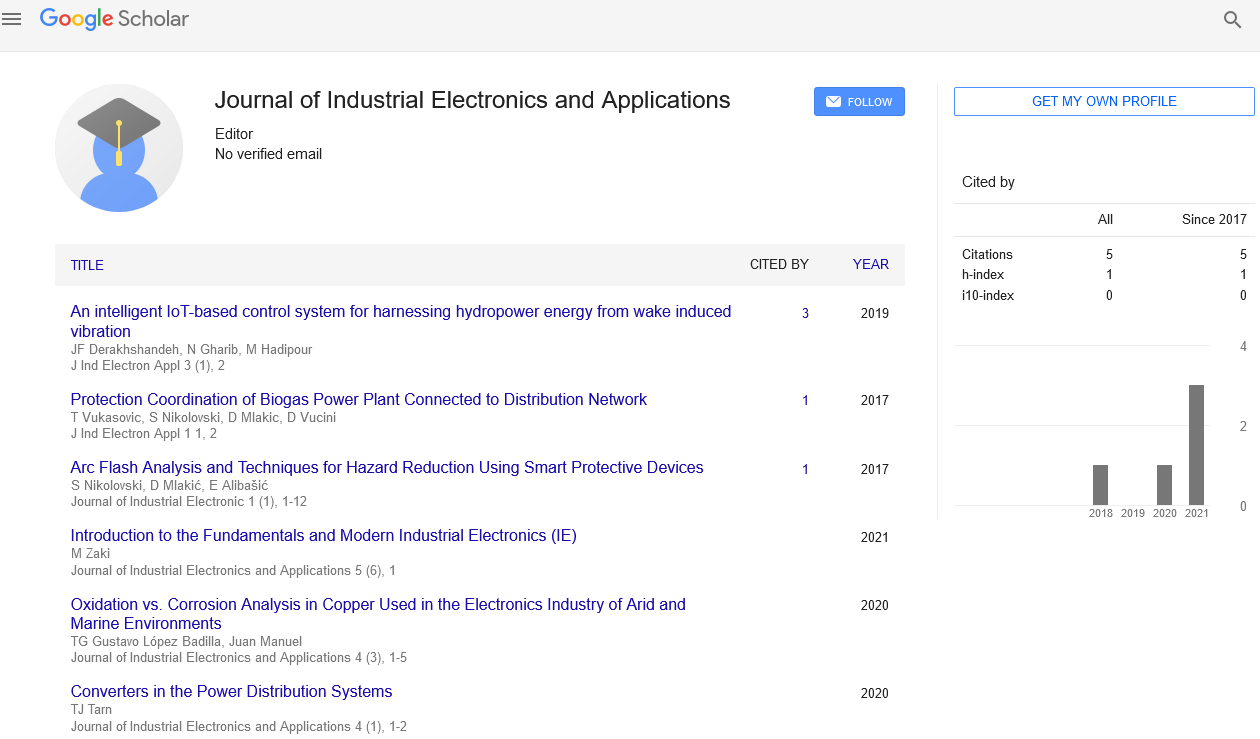Opinion Article, J Ind Electron Appl Vol: 7 Issue: 2
Power Grid Revolution: A Sustainable Future with Smart Energy
Heimicke Shumsky*
1Department of Intelligent Control, Institute of Marine Technology Problems, Vladivostok, Russia
*Corresponding Author: Heimicke Shumsky,
Department of Intelligent Control,
Institute of Marine Technology Problems, Vladivostok, Russia
E-mail: shumskyav1@dvfu.ru
Received date: 29 May, 2023, Manuscript No. JIEA-23-107951;
Editor assigned date: 31 May, 2023, PreQC No. JIEA-23-107951 (PQ);
Reviewed date: 15 June, 2023, QC No. JIEA-23-107951;
Revised date: 22 June, 2023, Manuscript No. JIEA-23-107951 (R);
Published date: 29 June, 2023, DOI: 10.4172/JIEA.1000031
Citation: Shumsky H (2023) Power Grid Revolution: A Sustainable Future with Smart Energy. J Ind Electron Appl 7:2.
Abstract
Description
The global energy landscape is undergoing a transformative shift, driven by the need to address pressing challenges such as climate change, energy security, and increasing energy demand. Power grid modernization and the adoption of smart power grids have emerged as key solutions to overcome these challenges and build a sustainable energy future. In this opinion article, we delve into the significance of power grid modernization and smart power grids, exploring their potential to revolutionize the way we generate, distribute, and consume electricity.
The imperative for power grid modernization
Conventional power grids, often referred to as "legacy grids," were designed for a different era with a centralized power generation model and limited two-way communication. As the world's energy demands soar and renewable energy sources gain traction, modernizing power grids becomes essential. Power grid modernization entails upgrading aging infrastructure, adopting advanced technologies, and implementing intelligent systems to optimize grid performance.
Enhancing grid resilience and reliability
Power grid modernization enhances grid resilience and reliability, critical factors in minimizing disruptions caused by natural disasters, cyber threats, or equipment failures. Advanced sensors, monitoring systems, and automation enable real-time monitoring and faster fault detection, leading to swift restoration of power supply and reduced downtime.
Integrating renewable energy
One of the most significant advantages of modernizing power grids is the seamless integration of renewable energy sources. Smart grid technologies enable grid operators to accommodate variable renewable energy outputs, such as solar and wind, while ensuring grid stability. This integration reduces reliance on fossil fuels, curtails greenhouse gas emissions, and moves the world closer to a low-carbon future.
Empowering consumers with smart grids
Smart power grids put power into the hands of consumers, enabling them to actively participate in energy management. With smart meters and real-time data, consumers can monitor their energy consumption, adjust usage during peak hours, and make informed decisions to optimize their energy bills and reduce overall consumption.
Enabling demand response
Demand response programs, facilitated by smart power grids, empower consumers and businesses to respond to fluctuations in electricity prices and grid conditions. By voluntarily adjusting their energy consumption during peak periods, participants contribute to grid stability and lower energy costs.
Enabling energy storage integration
Power grid modernization also facilitates the integration of energy storage technologies. Energy storage systems, such as batteries and pumped hydro storage, store excess renewable energy during periods of low demand and release it during peak hours, ensuring a constant supply of electricity and enhancing grid flexibility.
Enabling Electric Vehicle (EV) charging infrastructure
As the world shifts towards electric mobility, smart power grids play a pivotal role in supporting EV charging infrastructure. Advanced metering and control systems enable optimized charging and management of EVs, reducing the load on the grid and maximizing the utilization of renewable energy for charging.
Grid decentralization and micro-grids
Power grid modernization encourages decentralization, allowing for the establishment of micro-grids. Micro-grids are localized energy systems that can operate independently or be connected to the main grid. In remote areas or during emergencies, microgrids can ensure uninterrupted power supply, promoting energy resilience.
Addressing cybersecurity concerns
As power grids become more interconnected and reliant on digital technologies, cybersecurity becomes a critical consideration. Modernized power grids implement robust cybersecurity measures to protect against cyber threats, safeguarding critical energy infrastructure and ensuring the resilience of the grid.
The role of Artificial Intelligence (AI) in smart power grids
Artificial intelligence plays a vital role in optimizing the operation of smart power grids. AI-powered algorithms can analyze massive amounts of data, predict energy consumption patterns, and optimize grid operations to enhance energy efficiency and reduce waste.
Conclusion
Power grid modernization and the evolution towards smart power grids hold the key to a sustainable energy future. The integration of renewable energy sources, advanced monitoring systems, and intelligent control mechanisms will reshape the energy landscape, making it cleaner, more resilient, and consumer-centric. As nations strive to meet their climate goals and transition to low-carbon economies, investing in power grid modernization becomes a strategic imperative. Collaboration between governments, energy regulators, utilities, and technology providers is crucial to overcome the challenges associated with transitioning to smart power grids.
Furthermore, empowering consumers with real-time energy data and promoting demand response participation can create a culture of energy efficiency and sustainability. Additionally, the integration of electric vehicles, energy storage, and micro-grids will usher in a new era of energy self-sufficiency and environmental stewardship. In conclusion, power grid modernization and smart power grids represent a transformative journey towards a cleaner, more resilient, and sustainable energy future. Embracing these advancements will not only revolutionize the energy sector but also reshape our society's relationship with energy, empowering individuals, businesses, and communities to be active participants in shaping a greener world.
 Spanish
Spanish  Chinese
Chinese  Russian
Russian  German
German  French
French  Japanese
Japanese  Portuguese
Portuguese  Hindi
Hindi 